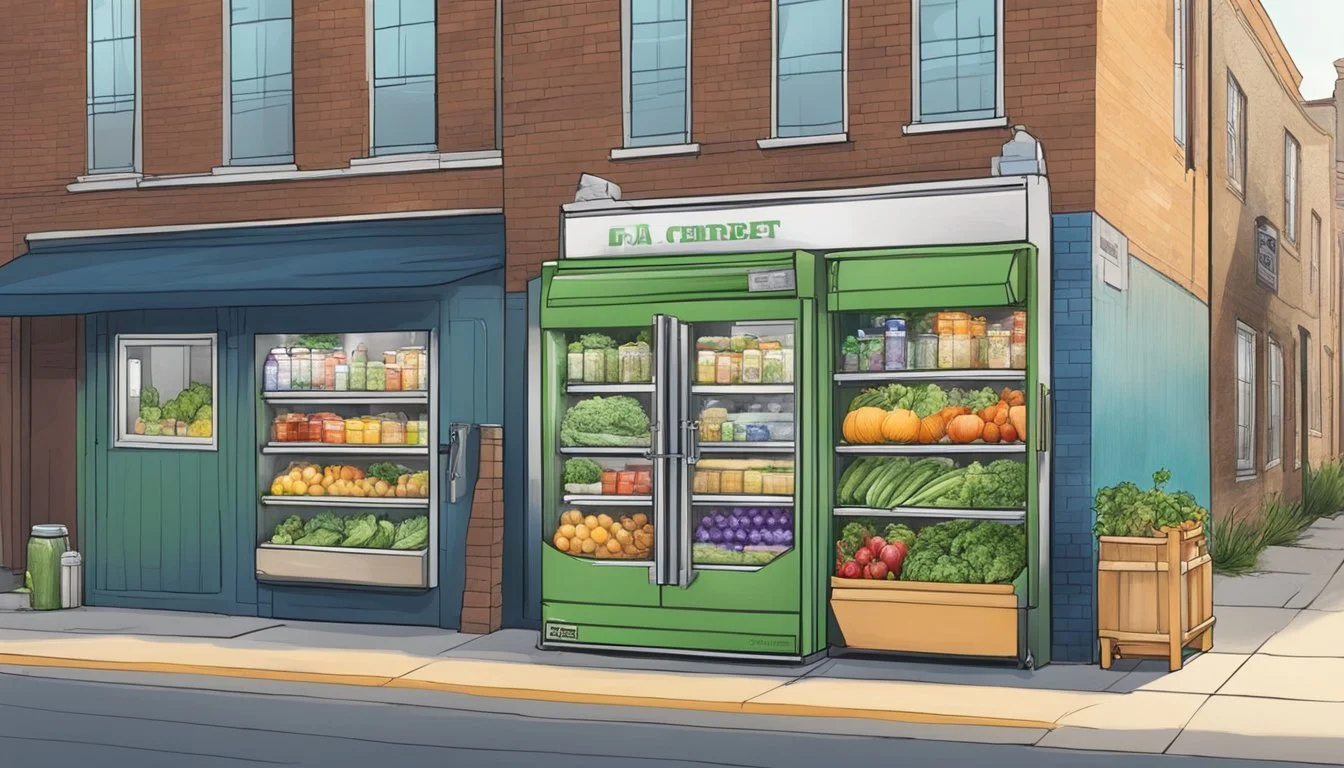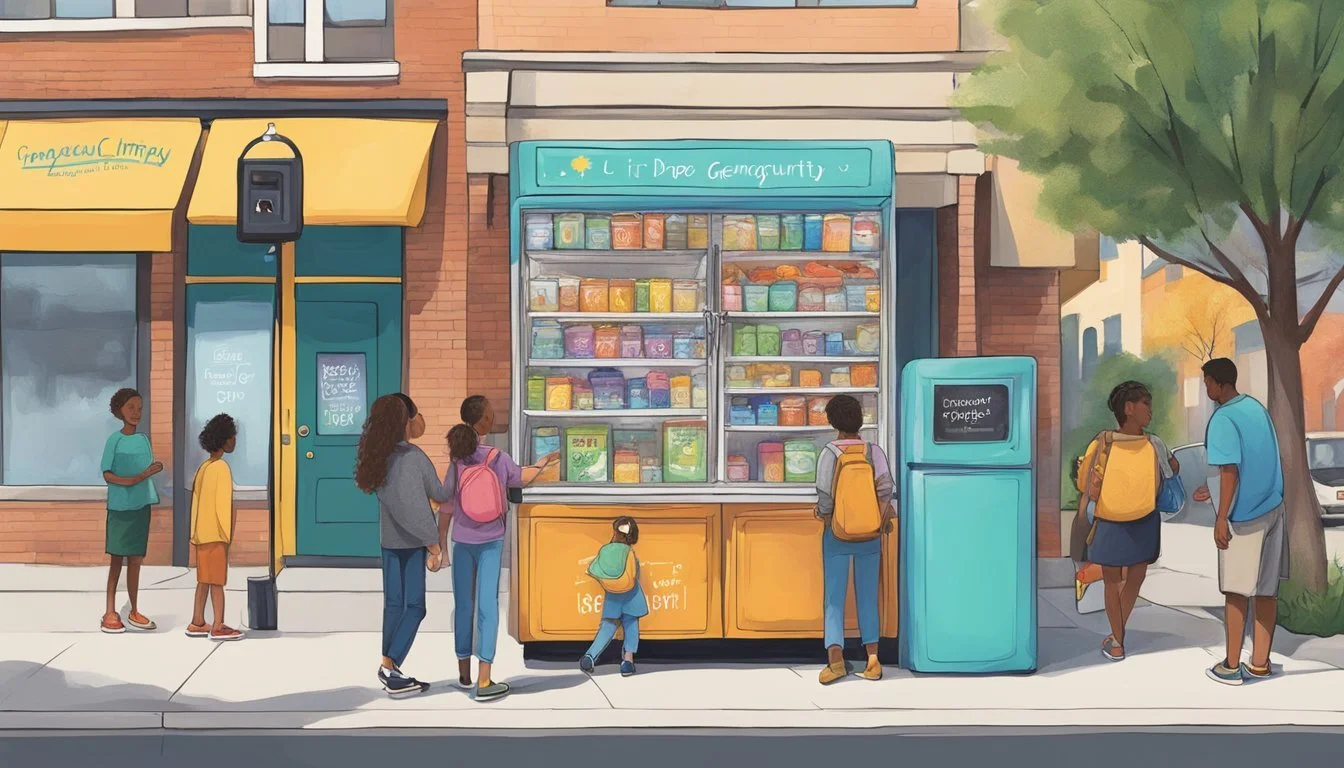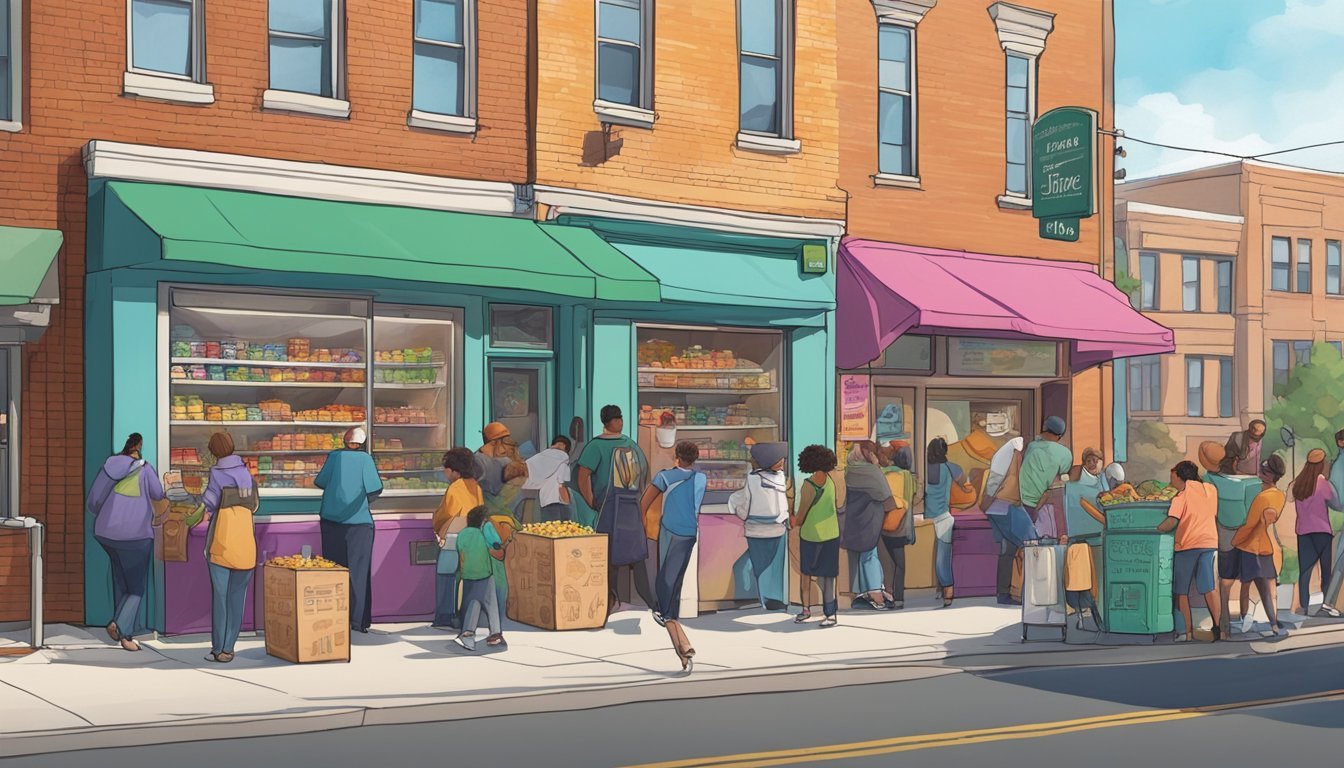Lincoln, NE Community Fridge
Tackling Food Insecurity Together
Lincoln, Nebraska, has taken a communal step toward addressing food insecurity and food waste with the establishment of the city's first community fridge. This initiative, installed by the organization Leadership Lincoln, offers a practical solution that not only assists those in need but also fosters a sense of solidarity among residents. The concept is simple yet impactful: a refrigerator where community members can freely donate and take food items.
Located at a central spot accessible to the public, the community fridge in Lincoln serves as a symbolic and functional beacon of community support. It's managed by volunteers and functions under the principle that everyone deserves access to food while also aiming to make a dent in food waste. As such, the fridge operates on the generosity of locals who are encouraged to leave grocery items for others who may be facing tough times or simply need a little extra help.
This community fridge comes as a response to the collective challenge of food insecurity, which affects numerous families in urban and rural areas alike. By providing free food in an easily accessible manner, the community fridge aims to create a bridge between surplus and need, ensuring that less food goes to waste while quietly asserting the community's commitment to looking after its residents.
Background of Community Fridges
Community fridges are a grassroots response to food insecurity and food waste issues, providing a platform for mutual aid and community support. They have gained importance, particularly during the pandemic.
Concept of Community Frididges
Community fridges are public refrigerators that operate on the principle of take what you need, leave what you can. They aim to provide equal access to food for all members of the community, regardless of their economic status. These fridges are typically stocked with perishable and non-perishable food items. The idea is rooted in the concept of freedge, which is a blend of 'free' and 'fridge'.
History in Lincoln
In Lincoln, Nebraska, Leadership Lincoln became a notable proponent of community fridges, installing the city's first freedge to help alleviate hunger among local residents. The initiative blossomed in communities with higher rates of food disparities, with the initial fridge being placed at 612 S 42nd Street.
Related Movements
Parallel to community fridges, movements such as community pantries have been established. The onset of the COVID-19 pandemic led to a surge in these communal efforts, highlighting the importance of mutual aid and extending a safety net to those affected by economic and health crises. They not only address food scarcity but also encourage community cohesion and sustainable practices to reduce food waste.
Benefits of Community Fridges
Community fridges have emerged as a practical solution for enhancing food security and fostering neighborhood cohesion. By allowing people to share resources, they also play a critical role in reducing waste.
Addressing Food Insecurity
Community fridges in Lincoln, NE, offer direct relief to individuals facing food insecurity. They provide free access to food, ensuring that anyone in need can obtain nutritious items without cost being a barrier. This system operates on trust, with no prerequisites to take food, effectively tackling hunger in the local community.
Reducing Food Waste
Individuals and businesses contribute surplus food to community fridges, essentially transforming potential waste into valuable resources. This not only prevents edible food from ending up in landfills but also conserves the energy and labor invested in food production.
Donated Items: Non-perishables, fresh produce, and packaged goods.
Environmental Impact: Lessened as food circumvents the waste stream.
Strengthening Community Bonds
Community fridges foster a sense of unity and collective responsibility. By encouraging residents to donate and maintain the fridge, they strengthen ties within the community and promote a culture of sharing and caring.
Events: Food drives and educational talks.
Volunteering: Opportunities for community involvement and leadership.
Operating a Community Fridge
Running a community fridge in Lincoln, NE entails organizing food donations, ensuring the appliance's maintenance, and coordinating volunteer efforts. These activities are crucial to support the local community, reduce food waste, and offer easy access to fresh produce and perishables.
Managing Food Donations
Community refrigerators operate on the principle of sharing. Individuals and businesses donate fresh foods that are then available for free. It is important to have clear guidelines on what can be donated to maintain food safety. Perishable items such as fruits, vegetables, and bread are commonly accepted, whereas homemade meals may not be permitted due to health regulations.
Accepted Donations:
Fruits and vegetables
Packaged items with ingredients listed
Maintenance and Upkeep
The refrigerator must be kept in good working condition to safely store the food. Regular cleaning and checking of temperatures are essential parts of maintenance.
Weekly Tasks:
Clean shelves and surfaces
Discard expired or spoiled items
Verify temperature is at safe levels (typically below 40°F or 4°C)
Volunteer Coordination
Volunteers are the backbone of community fridge operations. Tasks include restocking, cleaning, and outreach. Coordination often requires a team effort and a centralized platform for volunteers to sign up for shifts and communicate.
Volunteer Roles:
Food collection and delivery
Refrigerator cleaning
Community engagement
By managing these aspects effectively, the Lincoln community fridge can continue to be a sustainable source of nutrition for those in need.
Finding a Community Fridge
Community fridges in Lincoln offer free food access and are mapped out for public ease. Two primary resources provide information: online maps and databases.
Accessing Free Food
Individuals seeking free food can visit community fridges which operate on the principle of "take what you need, leave what you can." In Lincoln, these fridges are stocked with grocery items donated by community members and organizations. One can stop by Lincoln's first community fridge, accessible to the public to either take or donate grocery items.
Information Resources
For those looking to find the locations of community fridges, resources are readily available:
Online Map: An interactive map is provided by some community fridge organizations, showing all fridge locations in the area.
Database Access: Comprehensive databases list addresses and contact details for each fridge, offering an efficient way to locate one nearby.
By utilizing these resources, individuals can easily locate a community fridge, contribute to reducing food waste, and address food insecurity within Lincoln.
Community Fridge Models and Examples
Community fridges are innovative solutions to address food insecurity and waste, offering free access to food for all who need it. They exemplify community-led responses to hunger, each adapting to local needs and resources.
Different Models
Community Fridges, or "Freedges," operate on a simple yet impactful model: a refrigerator placed in a public space where individuals and businesses can leave surplus food for others to take freely. The concept has evolved into various iterations. Some freedges incorporate gardens to provide fresh produce directly beside the fridge. Operational models such as the (n)ice box, mimic traditional fridge designs but are usually insulated boxes without the need for electricity. Across different communities, these models can be found in various forms, including the foco freedge and university-run programs like the NYU freedge and CSU freedge, where fridges are managed by students and faculty to serve both university and local populations.
Success Stories
Communities around the world have transformed the free fridge model into local success stories. In Lincoln, Nebraska, the Leadership Lincoln initiative has seen repeated restocking of their community fridge, indicating high community engagement. Other cities report similar positive impacts, with fridges often becoming centers of community cooperation and support.
Case Study: New York City
In New York City, a dense urban environment with diverse communities, multiple community fridges have emerged. They are often decorated with art and located in accessible places to destigmatize food insecurity. Groups like NYU freedge not only increase access to food but also bring students and local residents together, demonstrating the dual benefits of community care and waste reduction.
Challenges and Considerations
The implementation of community fridges in Lincoln, NE has been met with enthusiasm, yet it encounters notable challenges including safety and sanitation standards, legal compliance, and long-term sustainability.
Safety and Sanitation
Community fridges aim to provide accessible food while maintaining high safety and sanitation standards. Challenges include:
Ensuring food is stored at safe temperatures to prevent spoilage or contamination.
Regularly cleaning and monitoring the fridges to protect community health.
Legal Implications
Legal considerations for community fridges entail:
Compliance with local health department regulations for public food distribution.
Navigating public property laws when placing fridges in accessible areas.
Sustainability
The sustainability of community fridges relies on:
Consistent donations to keep the fridges stocked.
Volunteer engagement for maintenance and restocking.
Overcoming acts of vandalism which can threaten the fridges' operation and longevity.
Local News and Developments
In Lincoln, Nebraska, the opening of the first community refrigerator marks a significant stride in addressing food insecurity. This initiative, spearheaded by local organizations such as Leadership Lincoln, is a response to the growing demand for accessible food resources in the community.
Community Fridge Updates
The first community fridge in Lincoln has become a communal asset, installed at 612 S 42nd Street. Regular restocking efforts signify the continual effort to alleviate hunger, as the fridge is frequently emptied due to high demand. The commitment of local organizations ensures that excess food is distributed efficiently. Maintaining the refrigerator's operations, however, is not without challenges; incidents such as vandalism have occurred, highlighting the need for community vigilance and the potential consideration of security measures such as cameras or increased lighting.
Impact Stories
The profound effects of the community fridge are evident in the personal anecdotes from residents. Many individuals who struggle to afford groceries now face fewer burdens thanks to the availability of free, fresh food. It has also promoted a spirit of solidarity, as neighbors don masks and ensure proper hygiene while sharing resources. While direct stories from beneficiaries are not detailed here, feedback suggests the project's positive influence on the community's well-being.
The project serves as a pertinent local news topic and demonstrates how a simple act of sharing can have a considerable impact on those facing food scarcity. The initiative continues to gain attention, reflecting the collective desire to support fellow residents.
How to Contribute
Community support is vital for the success of the Lincoln, NE Community Fridge. Individuals can contribute through donations or by volunteering their time.
Donating Food and Supplies
Food Items: Donors are encouraged to bring perishable and non-perishable food items that are in good condition, taking care to ensure the items are within their expiration dates.
Acceptable Food Donations Not Accepted Fresh fruits and vegetables Expired products Packaged items (unopened) Alcoholic beverages Dairy products (within date) Home-cooked meals (how long do cooked meals last?) Bread and baked goods Opened or used items
Supply Donations: Aside from food, the fridge also needs regular supplies, such as:
Cleaning materials
Organization bins
Food storage containers
Donations can be delivered directly to the community fridge location.
Volunteering Time
On-Site Assistance: Volunteers are sought to monitor and maintain the fridge, which includes organizing the stocked items, cleaning the facility, and ensuring the food remains fresh and accessible to community members.
Available Volunteer Shifts: Individuals interested in volunteering can check for available shifts and sign up accordingly.
Promotion and Awareness: Another form of volunteering consists of raising awareness about the community fridge, attracting more donors and volunteers through community outreach and social media engagement.
It is through these collective efforts that the Lincoln Community Fridge can effectively address local food insecurity issues. Interested individuals can contribute their time and resources to foster a supportive environment for all community members.
Future Perspectives
The Community Fridge initiative in Lincoln, NE is poised for dynamic progression. It embodies a model poised for both quantitative growth and qualitative innovation.
Expansion and Growth
The Community Fridge network in Lincoln has demonstrated viability and has a potent potential for scale-up. Leveraging the success of the first installations, stakeholders are exploring opportunities to increase the number of fridges across the city. The model's adaptability makes it suitable for varied neighborhoods, expanding access to fresh food.
Strategic Locations: Identifying high-traffic and accessible locations to maximize usage and support.
Collaborative Partnerships: Engaging with businesses and organizations to foster a sustainable ecosystem for growth.
Innovative Approaches
Continuous innovation remains central to the program's evolution. The goal is not only to expand the number of fridges but also to enhance their functionality and the quality of service they provide.
Technology Integration: Utilizing apps or digital platforms to inform citizens of stock levels and needed items.
Educational Programs: Pairing fridges with initiatives that teach food literacy and healthy eating habits.
By staying at the forefront of community-based solutions to food insecurity, Lincoln's Community Fridge initiative is setting a benchmark for others to follow, underscoring the importance of local action in addressing broader societal challenges.











